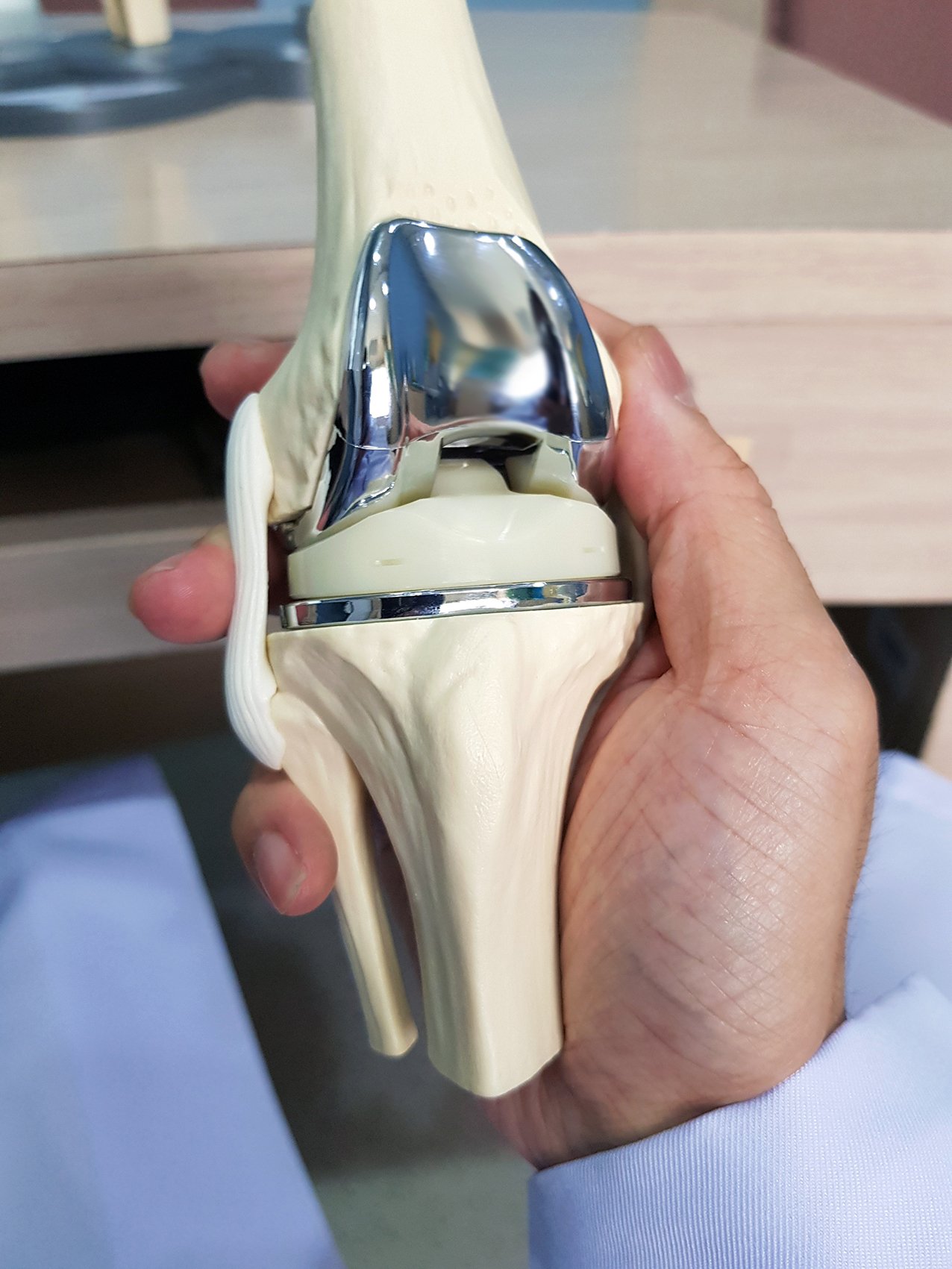Total Knee Replacement
About Total Knee Replacement Surgery
Total knee replacement is undertaken primarily to treat arthritis of the knee joint, most commonly osteoarthritis. The operation aims to reduce pain and improve function and, for some, simply improve their overall quality of life.
During total knee replacement surgery, the joint surfaces in the knee are removed and replaced with artificial joint surfaces made from metal and plastic. These parts are implanted with cement. There are different types of knee replacement components (prostheses), and Mr Patten will discuss with you prior to surgery which prosthesis may be best suited to you. This is decided based on factors such as your age and lifestyle.
Following surgery, patients feel generally comfortable after four weeks, and mostly recovered by three to four months from surgery. Patients regain the last subtleties of their recovery in the months after that, and it may take up to twelve months for your knee to feel “normal” again.
What to expect after total knee replacement surgery:
After surgery, you will be transferred to the recovery room, where hospital staff will monitor you as you wake up after the anaesthetic. You will then be taken back to your hospital room.
Early mobilization is very important and on the day after surgery or sometimes on the day of surgery, physiotherapists will give you exercises to start your recovery. It is important to follow these exercises in hospital and continue them at home to ensure the maximum result from surgery and avoid knee stiffness.
Patients are usually hospitalized for approximately five days before returning home or being discharged to a rehabilitation facility prior to their return home. Rehabilitation requirements and options will be discussed with you by the hospital’s rehabilitation coordinator during your admission. You will be taught the proper techniques for activities of daily living as you recover, such as bending, sitting, and using stairs.
You will be using two crutches or a frame initially, until you are able to manage with one crutch and are able to use your operated knee functionally and safely, and walk without a limp. Patients generally use two crutches for three weeks, and then use one crutch in their opposite hand for four to six weeks.
Caring for your total knee replacement wounds:
The dressing over your wound will need to remain intact, clean and dry for two weeks after surgery. You may shower, but do not have a bath or swim until you see Mr Patten in his rooms at your post-operative appointment and has cleared you for such activities. You should avoid getting the dressing wet in the shower. If the dressing begins to lift, use tape to stick the dressing back down. A small amount of bleeding into the dressing is normal. Swelling in the knee and leg is expected. Resting, elevating the leg, and applying ice can significantly help reduce swelling.
Mr Patten will advise you what type of stitches you have in your wound; these may need to be removed at around two weeks from surgery, or they may be dissolving stitches which do not need to be removed. For further information regarding wound management, please read the ‘post-operative wound management’ leaflet provided to you by our rooms before surgery.
Managing your total knee replacement pain:
Pain is a normal part of the healing process after surgery and will slowly improve over time. In the early days following surgery you should rest and elevate the leg, as well as regularly ice your knee, as this will all significantly help to reduce pain and swelling.
On discharge from hospital you will be provided with some pain relief for pain control. For ongoing pain relief requirements, we suggest you arrange an appointment with your GP to obtain a prescription. After surgery you should take pain relief as long as you have pain, particularly when walking or at night.
If you are concerned about your level of pain, please do not hesitate to contact our rooms for reassurance and to rule out a rare complication.
Recovery from total knee replacement surgery:
You will generally feel quite comfortable after four weeks, and almost fully recovered after three months from surgery. Patients tend to regain the last subtleties of their recovery in the following months and it may take up to twelve months for you to feel “normal” again.
The time you may require off work varies depending on the nature of your job. For sedentary, desk-based work you will likely require three to four weeks off work, whereas for more labor-intensive duties you will need to remain off work for approximately six to eight weeks. The average time before you can resume driving after a right knee replacement is six weeks, and three weeks to six weeks after a left knee replacement, depending on whether your car is automatic or manual.
Prior to any dental work, advise your dentist that you have had a knee replacement, as antibiotic cover is recommended. Mr Patten does not suggest antibiotic cover for a scale and clean only.
Total knee replacement risks and complications:
Although uncommon, complications can occur. These include superficial wound infection, blood clot, or persistent knee area pain. Rare complications include injury to surrounding structures such as nerves or blood vessels, or infection within the knee joint (peri-prosthetic infection). Over time a knee replacement can wear out, come loose, or the bone around the prosthesis may fracture (peri-prosthetic fracture), all of which may require further surgery.

